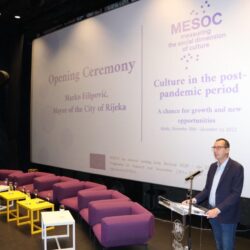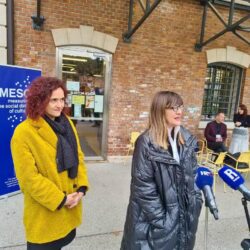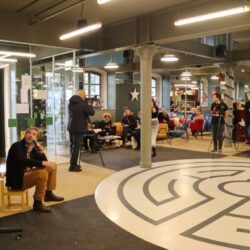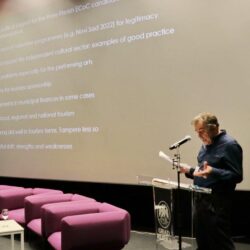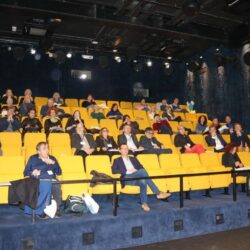
The two-day international conference “Culture in the post-pandemic period – a chance for growth and new opportunities” in Rijeka has brought together Croatian and European experts in the field of cultural policies.
The first day of the conference organised by the City of Rijeka and the opening programme, were held in the Children’s House, while the second day of the conference will be held tomorrow in the premises of RiHub.
The conference, focussing on the topics of urban and territorial renovation and regeneration, as well as the inclusion and participation of citizens, is realised within the implementation of the European project MESOC (Measuring the Social Dimension of Culture), funded under the Horizon 2020 – EU Research and Innovation Framework Programme and Rijeka is among 10 European cities that take part, along with Athens, Barcelona, Cluj, Ghent, Issy-les-Moulineaux, Milan, Turku, Valencia and Warsaw,
As pointed out by the mayor’s advisor Suzana Belošević Romac, the conference programme addresses the social dimensions of culture, urban regeneration of spaces, the influence of culture on health and well-being, as well as the participation of citizens in culture.
The Mayor of Rijeka Marko Filipović expressed his satisfaction with the fact that the conference is held in the Children’s House, in the art quarter, which intended use was changed from the industrial complex into spaces intended for culture, and the funds invested in its renovation represent the largest investment in culture since Croatian independence.
- Mayor of Rijeka Marko Filipović
- First day of the conference in the premises of the Children’s House
- Đurđa Vrljević Šarić and Suzana Belošević Romac
We’ve got these new cultural spaces owing to the fact that Rijeka was the European Capital of Culture in 2020, as the biggest infrastructural legacy of this project. However, the fact that is also very important as the project legacy are the people who were included in conceiving and implementing programmes, the volunteers who participated, as well as the citizens who visited the programmes. I believe that in this space in the future we will continue promoting numerous programmes such as this conference which brings together experts who ponder over public spaces intended for culture”, said the mayor in his welcome speech.
The conference participants were welcomed by Gordan Jelenić, vice-rector for science and art at the University of Rijeka, and Irena Kregar Šegota, head of the Directorate for Cultural and Artistic Development of the Ministry of Culture and Media.
The head of the Department of Culture, Ivan Šarar, spoke about the change of intended use of the Rikard Benčić complex from industrial spaces into spaces intended for culture. “Culture is not something that is measurable in monetary terms, and for this reason culture must prove itself day after day, by how its programmes are important, attractive, and visited, it must never give up, because every reference to culture with the aim of measuring it through the invested and received values, in some way, will be against it. It is up to us to be loud and to have quality and strong arguments about the greater importance of culture than its economic profit, and that is why I am glad that we will have the opportunity to exchange our experiences in two days”, said Šarar.
Central lectures will be given by Dinko Peračić, founder of Platforma 9.81, award-winning author of a series of architectural projects for public spaces and buildings, including the concept of the Museum of Modern and Contemporary Art in Rijeka, and Franco Bianchini from Leeds Metropolitan University, who will present research on the effects of Covid 19 pandemic on the realisation of individual projects of European capitals of culture and their further planning. Peračić and Bianchini will take part in the central panel discussion of the conference titled “New and/or shared spaces in culture”, through which they will discuss the democratisation of culture, participatory management and inclusion of citizens.
- Introductory words by Ivan Šarar, head of the Department of Culture
- Franco Bianchini from Leeds Metropolitan University
- The conference brings together European experts in the field of cultural policies
Božena Stojić from the Ministry of Space, Belgrade, will share her experience, gained in actions aimed at activating abandoned spaces, and an attempt to solve challenges related to their management and accessibility, which should consequently lead to participatory planning of the city’s development. Ivan Šarar, head of the Department of Culture, will present the revitalisation and change of intended use of industrial heritage in the cultural quarter Benčić and the activities of the Children’s House, which programmes are formed by the cultural institutions of the City of Rijeka, and Đurđa Vrljević Šarić from the Fortress of Culture, Šibenik, which manages three revitalised fortresses in Šibenik, St Michael’s Fortress, Baron Fortress and St. John’s Fortress and the House of Art Arsen, a new city stage created by transforming the old cinema hall, in which new life was breathed under the name of Arsen Dedić.
Throughout the remaining part of the programme, participants will also be able to listen to the panel discussion “Traditional vs digital approach – different perspectives for culture” with the participation of Sara Vuletić (programme director of Novi Sad – European Capital of Culture), Božidar Kovačić (University of Rijeka), Edvin Liverić (Croatian Cultural Centre in Sušak), Sendy Ghirardi (University of Valencia), and Ilaria Vitellio, (CityOpenSource) to discuss the relationship between traditional and digital culture, future perspectives and manners in which the outcome of the MESOC project can help the creation of long-term cultural policies. Through the conference programmes, 6 cities will be presented, that will present, through a thematic unit, initiatives that have transformed cities (as in the case of Valencia, Lublin and Šibenik), big projects that have been realised (presentation of inclusion of Rijeka citizens in the project Rijeka 2020 – European Capital of culture), or are being realised (Novi Sad – European capital of culture) or are still being planned (Nova Gorica – European capital of culture in 2025).


